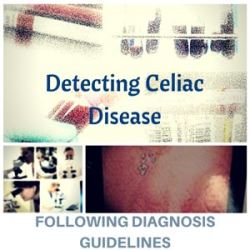Research: some doctors don’t follow celiac diagnosis guidelines
December 15, 2014 by Amy Leger | G+ Amy Leger What is the best way to diagnose celiac disease? In May of 2013, experts in the field came up with the guidelines and published them in the American College of Gastroenterology. But a new survey says a good portion of doctors don’t follow the celiac diagnosis guidelines.
What is the best way to diagnose celiac disease? In May of 2013, experts in the field came up with the guidelines and published them in the American College of Gastroenterology. But a new survey says a good portion of doctors don’t follow the celiac diagnosis guidelines.
Gastroenterology and Endoscopy News reported this month that only one-fifth of the doctors surveyed said they would diagnose celiac through an endoscopy and biopsy of the small intestine, which is the gold standard.
Getting the blood (serology) test done first is very important. But then the guidelines clearly state: “Upper endoscopy with small-bowel biopsy is a critical component of the diagnostic evaluation for persons with suspected CD and is recommended to confirm the diagnosis. (Strong recommendation, high level of evidence).”
“I think there is insufficient awareness of the potential for false-positive results with the tTG [tissue transglutaminase antibody],” Daniel A. Leffler, MD, MS, director of research at The Celiac Center at Beth Israel Deaconess Medical Center (BIDMC) and director of quality assurance in the Division of Gastroenterology at BIDMC, in Boston told Gastroenterology and Endoscopy News. Said another way, because there is potential for false-positive results in the blood tests, that is why doctors should follow up with the biopsy.
The other alarming thing – that actually was more jaw dropping to me – was that nearly 10% of doctors responded that prescribing a gluten-free diet would NOT be their “first line of treatment for newly diagnosed patients.” What? What would it be then?
Ben Lebwohl M.D. from Columbia University’s Celiac Research Center chimed to G & E News on this topic,“There are details of celiac disease management that are subject to debate, but certain aspects of care, such as the need for a strict gluten-free diet, are beyond debate,” said Dr. Lebwohl said.
In all, about 80 doctors responded to this survey, conducted, in part, by Aline Charabaty, MD, director of the IBD Center at Georgetown University Hospital, in Washington, D.C. The breakdown in specialty included 16 gastroenterologists, 26 primary care physicians, and 29 osteopaths, nurse practitioners and obstetricians. 9 others didn’t specify their specialty.
Other interesting stats from the survey:
- 63% said they would refer a patient to a gastroenterologist
- 68% said they would refer to a dietitian
- Typical GI symptoms are what lead the medical practitioner to the diagnosis
- Few noticed atypical symptoms like early osteoporosis, neurological symptoms, bloodwork abnormalities Down Syndrome and Type 1 diabetes
Click here to read the article on the survey. Researchers said additional education on diagnosing celiac is important for those in the medical field.
Here are a few other links you might be interested when it comes to diagnosing celiac disease:
- 5 Tips for Primary Care Physicians to Detect Celiac Disease
- Bloodwork shows Celiac? What you need to know before the biopsy
Tags: biopsy, blood, celiac, diagnosing, diagnosis, diet, disease, disease symptoms, free, gluten, gluten-free, patient, symptoms, test, treatment



Leave a Reply